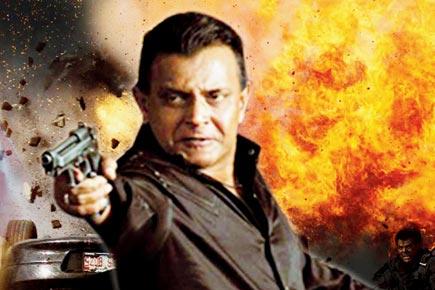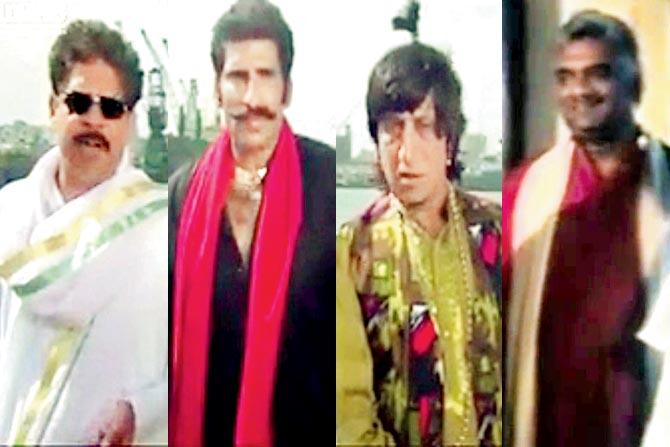As award acceptance speeches go, this was a pretty lame, and grammatically incorrect one: Mujhe bahut khushi hui hai yeh milke (sic). No doubt still, this was a rather emotional moment; historic, even

Having left Bombay in late 80s, Mithun started a parallel film industry from Hotel Monarch in Ooty, where he lived
ADVERTISEMENT
As award acceptance speeches go, this was a pretty lame, and grammatically incorrect one: "Mujhe bahut khushi hui hai yeh milke (sic)." No doubt still, this was a rather emotional moment; historic, even. The award show anchor, after delivering a 20 frickin' minutes' long introduction, asked audiences to give a standing ovation to the winner. Everyone instantly got up. The filmmaker I'd always wanted to meet but never knew what he looked like --longish frizzy hair, in tight green tee, and cock-buster jeans -- got on stage.
His busty muse Sapna, from a career spanning 50-plus films over a decade and half, was presenting her mentor his first award in his life, ever -- that too for lifetime achievement, at the self-explanatory Golden Kela Awards in Delhi's FICCI auditorium in 2012. "Kanti A-grade hai," she rightly exulted from the dais. We clapped.

(Left to right) Mohan Joshi (Pote), Mukesh Rishi (Bulla), Shakti Kapoor (Chuttiya), Deepak Shirke (Bhigona) in Gunda
Kanti, kaun? Kanti Shah. Well, how does one best describe him but to say that between Kanti Shah (Gunda) and Kundan Shah (Jaane Bhi Do Yaaro), you can basically map the entire spectrum of intentional (or unintentional) comedy in Bollywood. But that's fairly cryptic still.
So let me introduce you to the infamous legend around Kanti that everyone in Lokhandwala is only too happy to recount. Back in the mid-90s when Dharmendra's stardom had naturally faded and he could do with some work, if not extra cash, he did a string of scintillating C-grade films, some of them directed by Kanti -- Loha, Veer, Phoolan Haseena Ramkali, Munnibai -- besides others, like Aatank, Smuggler, Mafia, and Paappi Devataa (about half a dozen every year).
Kanti once approached Garam Dharam with a 'heart-attack' scene for his film that would take him just a day to wrap, and the remuneration would be handsome, if not princely. Dharam agreed. He came, he palpitated before the camera, and left.
Few weeks later (which is how long it took to go from set to screen), when the film first released in Punjab, what Dharam Paaji's fans saw was the old man orgasming in bed with a naked woman from an X-rated movie super-imposed next to him! The specifics of exactly what Dharam had shot change depending on who's recounting the story: apparently it was a horse-riding sequence, wherein Kanti only shot the sexagenarian hero's galloping face and morphed those images with him riding the heroine
instead!
Either way, Dharam's son Sunny Deol got wind of this. He called Kanti over to his office in Juhu's Sunny Super Sound, under the pretext of a script narration, and gave him a dhulai with his 'dhai kilo haath' that I'm told still echoes in that fourth floor sound-proof room. Another Kanti story, although unverified, that does the rounds is about him inviting Govinda over to his set once, since the actor was shooting next-door. He kept his camera switched on while Govinda arrived, and thereafter used that footage with Govinda starring in his picture eventually!
Now if merely the legends around a filmmaker's life are that interesting, one doesn't need to over-state the entertainment derived from his movies. Frankly, a lot of '90s kids in North India, I'm certain, have experienced a Kanti Shah moment, on video or big screen -- whether or not they're aware of it. It was an odd rite of passage, something that Vikramaditya Motwane captured perceptively with a bunch of boarding school kids rushing to catch Kanti Shah Ke Angoor in a local theatre, for fun, but chiefly to celebrate advent of puberty. My Kanti Shah moment -- Daku Ramkali -- happened in Dehradun with school friends on a trip, since our train back to Delhi was delayed, and the seedy theatre close to the station, and the poster of heroine Sapna, was impossible to resist!
All I recall from that film is a corny rape scene in the ravines, and Daku Ramkali on horseback, in a black shirt, with ample cleavage showing, seeking revenge. Effectively, these films were to the '90s what the Ramsay Bros. grind-house horror were to the '80s, which they made redundant, by the way, merely upping the sex quotient to deranged levels sometimes. It's like the relatively sane Right Wing testing limits of perversion with 'Alt Right' in politics!
If it wasn't for throwbacks on the Internet in the early 2000s, Kanti would've got buried in public memory along with apocryphal anecdotes about him in Andheri. At some point, thanks mainly to LAN (Local Area Networks) in Indian engineering campuses, Kanti's Gunda suddenly developed a cult of its own.
It hit a 'tipping point' (a puzzling moment in pop-culture, when something hopelessly relegated among us, suddenly becomes a thing of cool), wherein a whole new audience rediscovered and was mesmerised by a demented pic, entirely written in verse, set in a surreal world, where rape is a sport, and the main rapist characters introduce themselves looking straight to the camera -- Chuttiya on 'Vitamin Sex' (the trans-gender, Shakti Kapoor), supposedly named for his pony-tail; Bulla (who does everything 'khullam khulla'); Pote ('Baap ke bhi nahin hote')...
The only reason Gunda was a B-grade film, rather than C, was because of Mithun Da, the poor man's AB! Apparently disgusted by constant run-ins and extortion calls from the underworld in the late '80s, actor Mithun Chakroborty had locked his home in Bombay, packed his bags, and moved to Ooty for good.
From the cold climes of the South Indian hill-station, the actor perhaps unwittingly spawned a completely fresh genre in Hindi cinema -- the Mithun Da movie. The revenue model was quite simple. Mithun would charge R1 lakh a day for the shoot. The crew, as per contract, had to lodge in Hotel Monarch that he owned in Ooty.
This film industry had a dream run in the '90s, with almost nine releases every year, many of them cracking it in theatres in Bihar, Uttar Pradesh, Bihar-Bengal border, and single-screen cinemas in big cities serving working class village/small-town migrants. Films like Chandal (1998), Yamraaj (1998) and Mard (1985) maxed their returns on investment.
Did it matter what the audiences watched in those films, where Mithun Da alternatively played a cop, or sadak chhap,
inevitably avenging his sister's rape? Most of these subaltern classics, I reckon, were anti-dote to NRI movies of the '90s that used to leave most of India wholly clueless.
Also, one needed to watch something between Govinda's 'No. 1' comedies, or Akshay Kumar's 'Khiladi' pictures, or Sunny Deol, Salman, or Ajay Devgan's weepy action-romances. The '90s were simple times. We went to the movies, because it was there. Who cared for anything more?
During a dance sequence for the film Shapath (1997) once, Mithun kept getting his steps wrong. Pissed, and naturally pressed for time, given how many movies he worked on in a month, the hero blasted his dance director, "Abe, yeh step theek karunga toh picture hit hogi kya? Kahani aage badha!" They went ahead with shit steps. Shapath became Mithun's biggest hit among '90s low-budget curios.
 Subscribe today by clicking the link and stay updated with the latest news!" Click here!
Subscribe today by clicking the link and stay updated with the latest news!" Click here!







